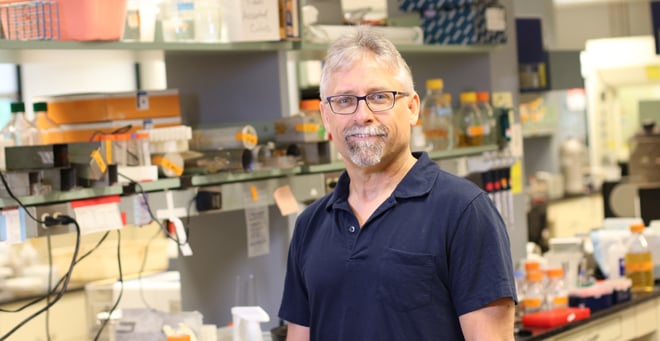 |
|
|
Craig L. Peterson, PhD |
UMass Medical School scientist Craig L. Peterson, PhD, has received a five-year, $4.5 million Maximizing Investigators' Research Award (MIRA) from the National Institutes of Health for research that explores the role chromosome structure plays in regulating gene expression, DNA repair and DNA fidelity during cell division.
Part of the NIH’s outstanding investigator award program, MIRA provides extended funding that enables researchers to devote more time and energy to working in the lab and less time to writing and revising grant applications. It is designed to encourage investigators to embark on ambitious, long-term projects of unusual potential.
“The MIRA award funds our research group as a whole. Consequently, we are free to pursue a broad set of research questions that fits within a general topic,” said Dr. Peterson, professor of molecular medicine. “We can follow the most exciting results, and we can discard research directions that are no longer at the cutting edge of the field.”
According to the National Institute of General Medical Sciences, which awarded Peterson’s grant, MIRA-supported investigators have greater flexibility to try ideas that might be considered high risk.
“The grant gives us freedom to perform high risk studies that would not be possible within an RO1 format, and we can change our research direction in order to study new exciting questions or hypotheses that we wish to tackle,” said Peterson.
“Much of our work on chromatin regulation is focused on a large family of multi-subunit enzymes called chromatin remodelers. We identified and purified the first of these enzymes, the yeast SWI/SNF complex.”
The Peterson lab found that SWI/SNF uses the energy of ATP hydrolysis to regulate chromosome structure and dynamics. This same family of enzymes is also found in humans. They are essential regulators of nearly every human chromosomal process and impairment of their function leads to a variety of diseases, including cancers and neurodegenerative disorders.
“Notably, mutations in genes that encode subunits of the human SWI/SNF complex are found in more than 20 percent of all human cancers, making it the second most prevalent target for oncogenic lesions,” said Peterson.
“There is now enormous interest in understanding how remodelers contribute to different disease states—many large and small biotech companies are now trying to target chromatin remodelers for therapeutic intervention. I expect that our biochemical studies on remodelers will suggest new targets for rational drug design, and that our molecular genetic studies in yeast are likely to provide insights into their function and regulation.”
Other MIRA recipients at UMMS include Andreas Bergmann, PhD, professor of molecular, cell & cancer biology; Patrick Emery, PhD, professor of neurobiology; and Paul Thompson, PhD, professor of biochemistry & molecular pharmacology.
Related stories on UMassMedNow:
Andreas Bergmann, PhD, receives Outstanding Investigator Award from NIH
Patrick Emery receives $4.1M outstanding investigator award